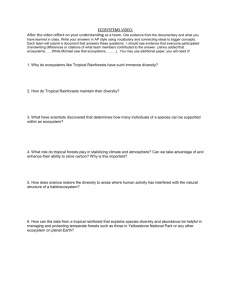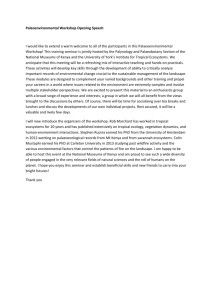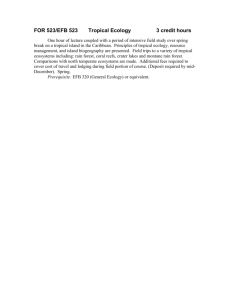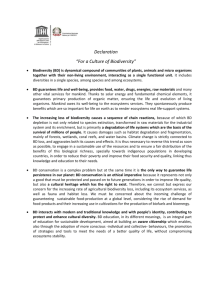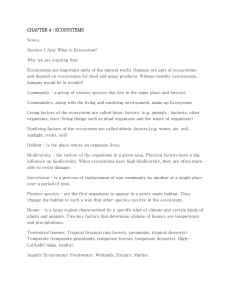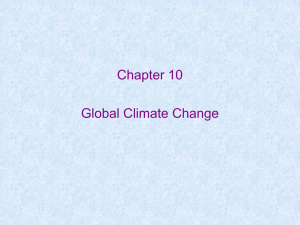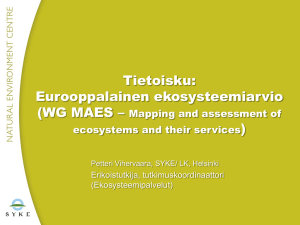TROPIMUNDO - Erasmus Mundus Masters Course in Tropical
advertisement
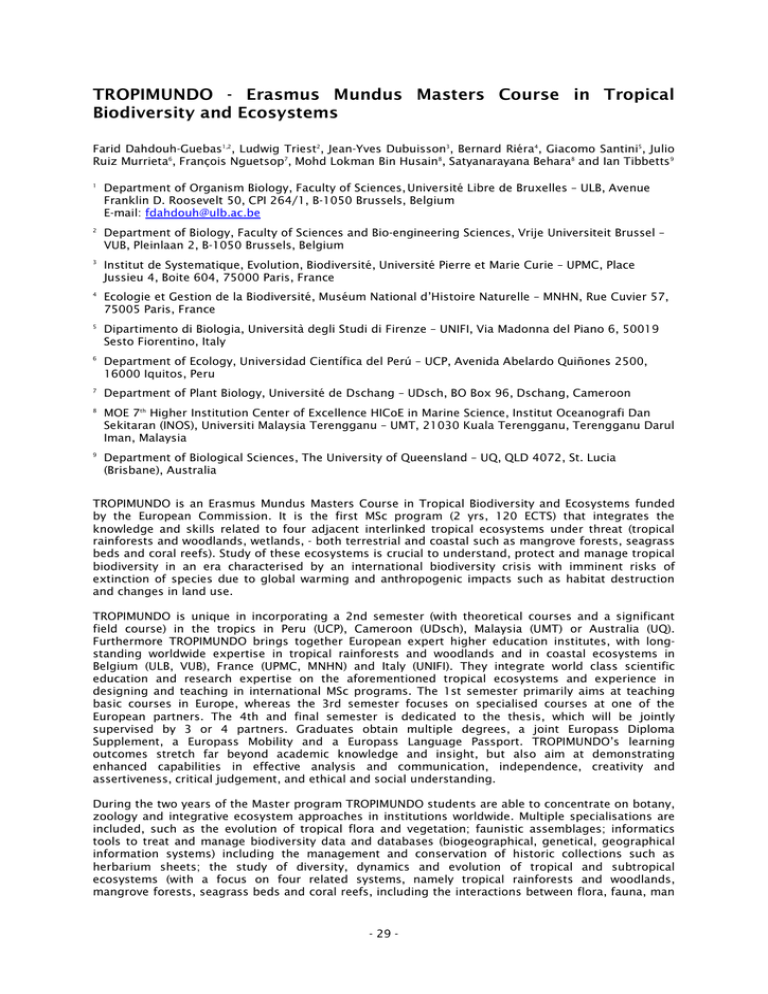
TROPIMUNDO - Erasmus Mundus Masters Course in Tropical Biodiversity and Ecosystems Farid Dahdouh-Guebas1,2, Ludwig Triest2, Jean-Yves Dubuisson3, Bernard Riéra4, Giacomo Santini5, Julio Ruiz Murrieta6, François Nguetsop7, Mohd Lokman Bin Husain8, Satyanarayana Behara8 and Ian Tibbetts9 1 Department of Organism Biology, Faculty of Sciences, Université Libre de Bruxelles – ULB, Avenue Franklin D. Roosevelt 50, CPI 264/1, B-1050 Brussels, Belgium E-mail: fdahdouh@ulb.ac.be 2 Department of Biology, Faculty of Sciences and Bio-engineering Sciences, Vrije Universiteit Brussel – VUB, Pleinlaan 2, B-1050 Brussels, Belgium 3 Institut de Systematique, Evolution, Biodiversité, Université Pierre et Marie Curie – UPMC, Place Jussieu 4, Boite 604, 75000 Paris, France 4 Ecologie et Gestion de la Biodiversité, Muséum National d’Histoire Naturelle – MNHN, Rue Cuvier 57, 75005 Paris, France 5 Dipartimento di Biologia, Università degli Studi di Firenze – UNIFI, Via Madonna del Piano 6, 50019 Sesto Fiorentino, Italy 6 Department of Ecology, Universidad Científica del Perú – UCP, Avenida Abelardo Quiñones 2500, 16000 Iquitos, Peru 7 Department of Plant Biology, Université de Dschang – UDsch, BO Box 96, Dschang, Cameroon 8 MOE 7th Higher Institution Center of Excellence HICoE in Marine Science, Institut Oceanografi Dan Sekitaran (INOS), Universiti Malaysia Terengganu – UMT, 21030 Kuala Terengganu, Terengganu Darul Iman, Malaysia 9 Department of Biological Sciences, The University of Queensland – UQ, QLD 4072, St. Lucia (Brisbane), Australia TROPIMUNDO is an Erasmus Mundus Masters Course in Tropical Biodiversity and Ecosystems funded by the European Commission. It is the first MSc program (2 yrs, 120 ECTS) that integrates the knowledge and skills related to four adjacent interlinked tropical ecosystems under threat (tropical rainforests and woodlands, wetlands, - both terrestrial and coastal such as mangrove forests, seagrass beds and coral reefs). Study of these ecosystems is crucial to understand, protect and manage tropical biodiversity in an era characterised by an international biodiversity crisis with imminent risks of extinction of species due to global warming and anthropogenic impacts such as habitat destruction and changes in land use. TROPIMUNDO is unique in incorporating a 2nd semester (with theoretical courses and a significant field course) in the tropics in Peru (UCP), Cameroon (UDsch), Malaysia (UMT) or Australia (UQ). Furthermore TROPIMUNDO brings together European expert higher education institutes, with longstanding worldwide expertise in tropical rainforests and woodlands and in coastal ecosystems in Belgium (ULB, VUB), France (UPMC, MNHN) and Italy (UNIFI). They integrate world class scientific education and research expertise on the aforementioned tropical ecosystems and experience in designing and teaching in international MSc programs. The 1st semester primarily aims at teaching basic courses in Europe, whereas the 3rd semester focuses on specialised courses at one of the European partners. The 4th and final semester is dedicated to the thesis, which will be jointly supervised by 3 or 4 partners. Graduates obtain multiple degrees, a joint Europass Diploma Supplement, a Europass Mobility and a Europass Language Passport. TROPIMUNDO’s learning outcomes stretch far beyond academic knowledge and insight, but also aim at demonstrating enhanced capabilities in effective analysis and communication, independence, creativity and assertiveness, critical judgement, and ethical and social understanding. During the two years of the Master program TROPIMUNDO students are able to concentrate on botany, zoology and integrative ecosystem approaches in institutions worldwide. Multiple specialisations are included, such as the evolution of tropical flora and vegetation; faunistic assemblages; informatics tools to treat and manage biodiversity data and databases (biogeographical, genetical, geographical information systems) including the management and conservation of historic collections such as herbarium sheets; the study of diversity, dynamics and evolution of tropical and subtropical ecosystems (with a focus on four related systems, namely tropical rainforests and woodlands, mangrove forests, seagrass beds and coral reefs, including the interactions between flora, fauna, man - 29 - and the environment within and between each of these adjacent ecosystems);conservation and restoration ecology of natural habitats and their biodiversity including competences in sustainable management and governance of biodiversity, and finally, in tropical ethnobotany, exploitation and valorisation of the functions, goods and services of natural habitats and their resources, and conservation of traditional ecological knowledge. TROPIMUNDO maximises the inclusion of European languages by offering a content and language integrated learning program (English or English + French), and it is delivered in a society that is French, English, Dutch, Italian or Spanish-speaking, which is valorised using buddy programs and Tandem Learning. This aims at improving the students’ language capabilities for which facilities are provided by all partners. TROPIMUNDO management is handled by a multi-level and shared responsibility involving 4 decision bodies (Steering, Selection, Internal Evaluation and External Evaluation), and 1 main execution structure (Coordination Office), all operating with equal commitment by the partners. A series of Associated Partners, including scientific institutes, governmental and non-governmental organisations responsible for conservation or management of tropical ecosystems and their biodiversity, and public authorities, agreed to advertise the program, to provide or to communicate existing placements, jobs, internships or thesis perspectives and scholarships, and to assist in evaluating the program. This links TROPIMUNDO to the real and professional world. References www.tropimundo.eu - 30 -
